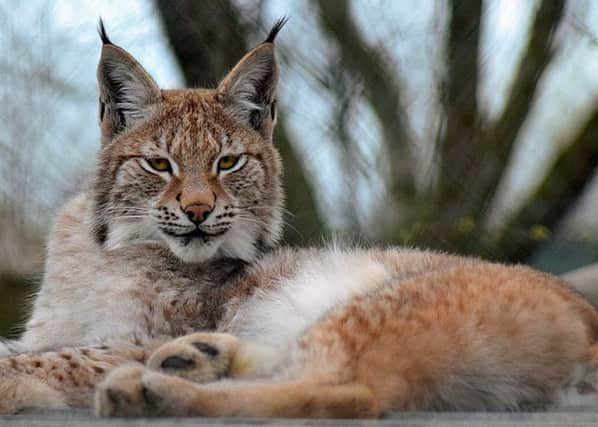Norway research trip stokes farmers' fear over lynx plans


The Lynx UK Trust is drawing up plans to release the wildcats into the wild just south of the Borders in Northumberland’s Kielder Forest and further north in Argyll and Inverness-shire, but farmers here and elsewhere in Scotland are opposed to the move.
According to research cited by the trust, a lynx in the wild would be likely to kill only one sheep every two years or so, but farmers’ representatives dispute that claim, saying the likely death toll would be far higher.
Advertisement
Hide AdAdvertisement
Hide AdIn Norway, they were told that the country’s 400-plus-strong lynx population accounted for more than 4,000 sheep fatalities last year, more than 20 times as many as the death rate being quoted by the trust.


On a study trip to the Scandinavian country, National Farmers’ Union Scotland (NFUS) delegates were told that the authorities there had paid out compensation for almost 20,000 sheep killed by predators including lynx last year.
Wolverines accounted for the lion’s share of that death toll, at 34% or around 6,800, followed by lynx on 21%, bears on 15% and wolves on 9%.
If those figures were replicated here, the six lynx proposed for release at Kielder would be expected to claim the lives of 60 sheep a year in the Borders and Northumberland, rather than the three or so suggested by the trust.
Advertisement
Hide AdAdvertisement
Hide AdScottish Government rural economy secretary Fergus Ewing has vowed that he would never support the reintroduction of lynx, extinct in Britain since the seventh century or thereabouts, to Scotland, and the union is urging him to keep up that stance.


It is also calling on UK Government Environment, Food and Rural Affairs Secretary Michael Gove to follow suit as he has decided to have the final say on the trial release proposed for Northumberland rather than leaving it to Natural England.
NFUS vice-president Martin Kennedy said: “Easily the biggest challenge Norwegian sheep farmers face is predation by large carnivores.
“Although sheep are housed for at least six months of the year, depending on which part of Norway you farm, when they graze up through the trees after lambing, they are extremely vulnerable.
Advertisement
Hide AdAdvertisement
Hide Ad“Predation has reduced over the past 10 years, but this isn’t because of fewer predators but more to do with the fact that a number of hill farmers have simply stopped keeping sheep.
“The Norwegian NFU believe that around 1,000 hill farmers have given up keeping sheep in the last decade as they simply cannot carry on at those levels of predation.
“It’s all very well receiving the compensation, but that doesn’t allow for the psychological impact that this scale of losses has on farmers.
“Putting myself in their shoes, I can understand why they’ve given up.
Advertisement
Hide AdAdvertisement
Hide Ad“We are in this business to produce good-quality food, and looking after our animals is a priority, so to see a healthy breeding animal being taken out by a predator early in her life would be horrendous.
“The Norwegians told us that to reintroduce predators into our country would be an absolute catastrophe.
“Their experience has simply strengthened our resolve to ensure that any proposals to do the same in Scotland receive rigorous scrutiny.”
Borders farmer Ross McAulay, of Wauchope Farm, near Bonchester Bridge, agrees, saying: “It just exposes the Lynx UK Trust as a complete farce.
Advertisement
Hide AdAdvertisement
Hide Ad“Fergus Ewing has said he would never support a move to reintroduce them in Scotland, so let’s just hope there is some cross-border agreement and Mr Gove takes this on board.”
Ettrick, Roxburgh and Berwickshire MSP Rachael Hamilton shares the farmers’ concerns.
Citing the case of a single escaped lynx in Wales reportedly killing seven sheep in a matter of days earlier this year, she said: “The NFUS’s findings are incredibly alarming.
“We must take lessons from our Norwegian friends, and any threat to agricultural livestock must be a key consideration, especially when the risk is so high.
Advertisement
Hide AdAdvertisement
Hide Ad“I urge all those in the Scottish Borders to submit their concerns about any reintroduction and make sure their voice is heard.”
Berwickshire, Roxburgh and Selkirk MP John Lamont added: “I have raised this issue repeatedly with Michael Gove MP. He has assured me that the views of Borderers, including farmers, will be taken into account in the decision-making process over the possible reintroduction of lynx.”